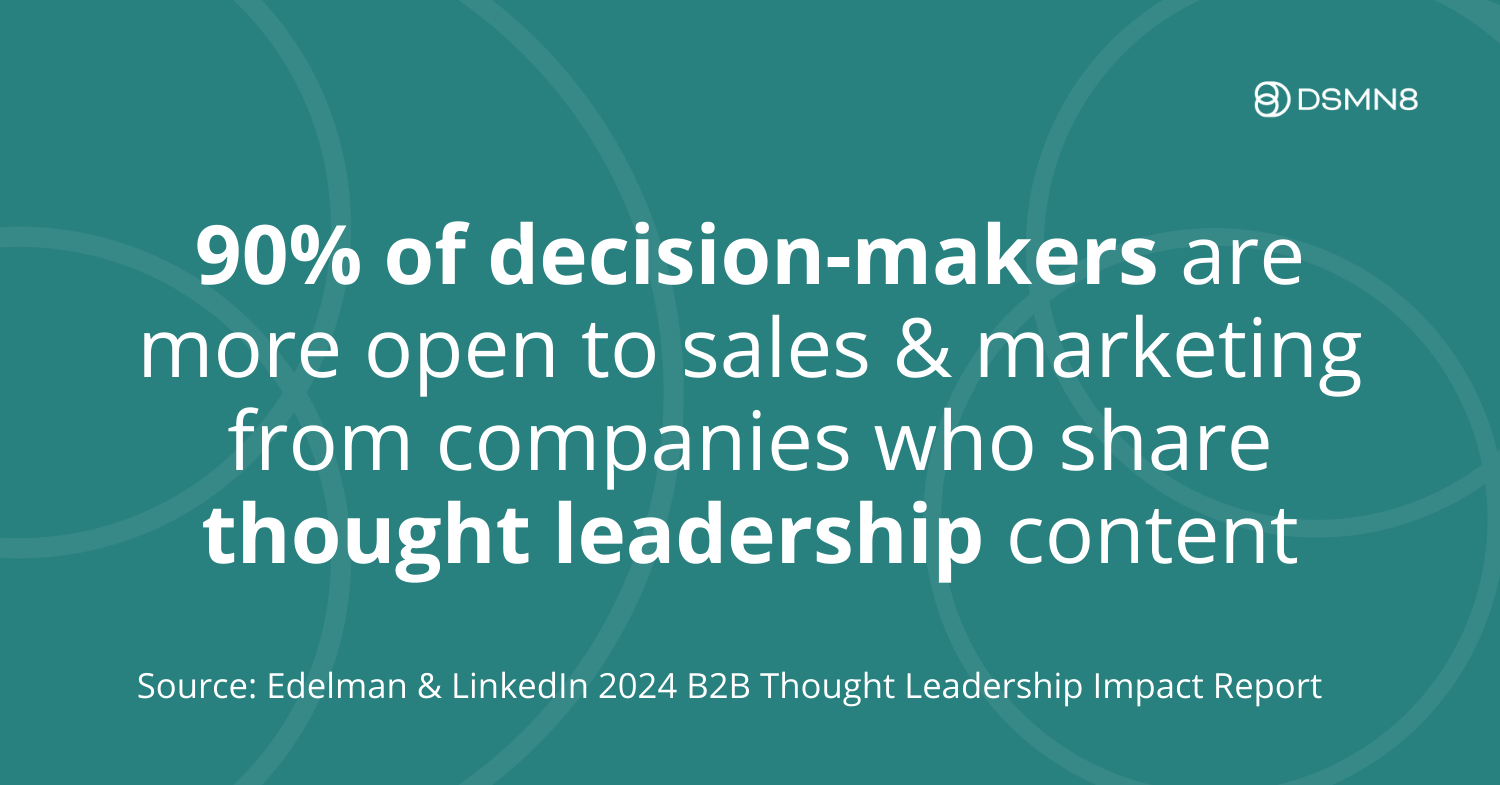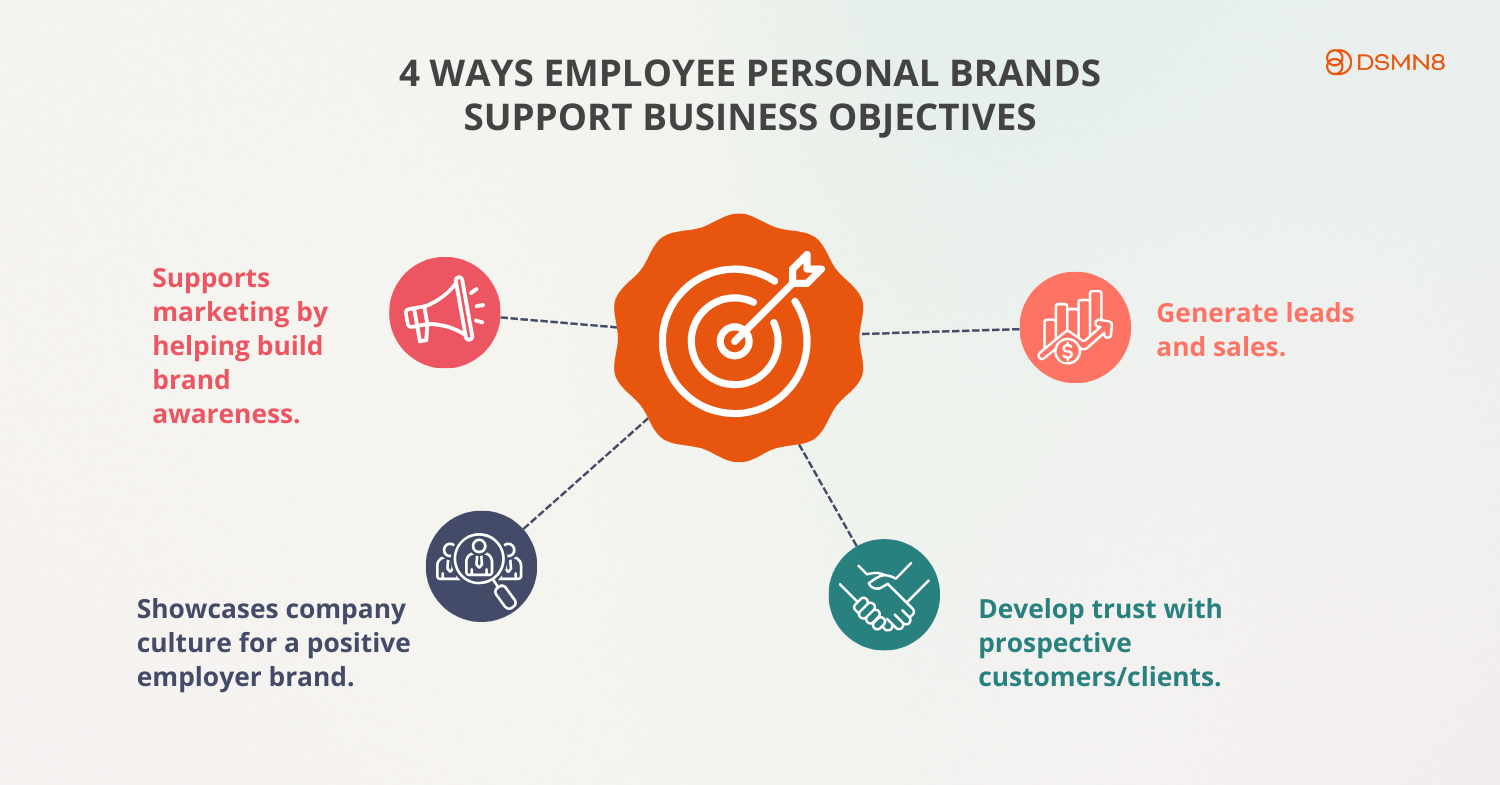
Last updated: 15th January 2026.
So, you want to build your personal brand as an employee.
You’re trying to navigate the tricky field of professional social media.
You want to be authentically yourself online while staying within your company’s social media guidelines.
You’ve seen horror stories in the media about employees getting fired over TikTok videos. You don’t want that to be you! 😩
Here’s exactly how to do it from DSMN8, the people who empower employees to build personal brands every day.
It’s time for personal branding 101, employee edition!
Check the Social Media Policy
The first thing to do is to check your company’s social media policy.
It might say you’re not allowed to post on social media.
Yikes 😬
It’s a very outdated approach, but unfortunately, we do still see companies with this mindset.
If this is the case, ask for clarity:
-
Is this policy up-to-date? With the rise of social media for work over the past decade, perhaps attitudes have since changed.
-
Does this apply to LinkedIn? Or is it more for personal social media use, e.g., catching up with friends on Facebook or scrolling on TikTok?
If you know it’s a no, you’ll have to get permission by demonstrating the value to leadership. Don’t worry, there’s some advice for you on that later.
The other scenario is that your company doesn’t even have a social media policy.
If that’s the case, they should probably grab our free template 👀
You’re in an easier position than those who work for companies with strict policies, but don’t take this to mean you can post whatever you want.
Follow these 3 essential rules to avoid any problems:
3 Rules to Follow When Posting On Social Media as an Employee:
Follow Brand Guidelines
Many companies will also have brand guidelines as well as a social media policy.
Brand guidelines tend to focus on design, such as logo variations, colors, and fonts for use in creating content.
They might also include specific phrases or words to use and things to avoid.
For example, some companies don’t allow the use of emojis for professionalism 😥
When talking about your work, the company, or products, be sure to follow these guidelines. Otherwise, you could upset legal or marketing and end up having to remove your post.
If you can’t find any brand guidelines, ask your marketing team to point you in the right direction. They’ll certainly have a brand kit you can take a look at.
Prove the Value of Employee Personal Branding
If your company already has an employee advocacy program, whether formal or informal, you’ll have no trouble with this.
And if you see others in your company posting on LinkedIn, you can pretty much skip this step! (Unless you’re feeling anxious and want a definite “yes you can do this”).
Ideally, get someone with influence in your corner, e.g., your head of department, before pitching to senior leaders.
How To Get Leadership Buy-In
Your main focus here should be on how your personal brand can benefit the company.
You’re probably thinking about the exciting opportunities building your online presence can bring. This could be anything from being interviewed on a podcast to industry event invitations.
But remember that it’s not all about you, especially if you’re trying to get your company to change its stance on an old policy!
Here are some ways employees having personal brands on social media benefits businesses:
-
Supports marketing by helping build brand awareness.
-
Showcases company culture for a positive employer brand, helping recruitment campaigns.
-
Develops trust with prospective customers/clients by demonstrating expertise.
-
Generates leads and sales.
Hit them with the stats 👇
If you work in sales, point out that 54% of decision-makers say they spend over an hour per day consuming thought leadership content (Edelman).
That’s a big opportunity to get noticed by the right people on LinkedIn.
If you’re a recruiter, this one should be at the forefront of your mind: 79% of job applicants use social media when looking for a job (StandOutCV). When they’re looking at your company, what will they see?
If you’re a marketer, you’ll probably have a bunch of these up your sleeve already, but:
According to Forbes, 84% of consumers believe that a company’s reputation is influenced by employees’ personal brands.
I strongly encourage you to watch/listen to this episode of the Employee Advocacy and Influence podcast featuring guest Anna Bertoldini from NielsenIQ.
She shares what she learned from first-hand experience building a personal brand as an employee. Anna has grown a community and progressed her career, all through posting on LinkedIn.
Alleviate the Fear
This is one of the biggest fears we’ve seen employees who want to build personal brands facing:
They worry that their manager or boss will think they’re looking for a new job.
The solution?
Have a conversation. Explain why you want to start posting on LinkedIn (or other social channels) and your goals.
Your boss shouldn’t feel threatened that you want to build your influence. In fact, they should be motivated to join you! 👀
Sharing your expertise on social media is a great way to support your company’s business objectives.
It works even better when the content comes from senior leadership because they will likely be influential already.
The 2025 Employee Advocacy Benchmark Report revealed that 73% of program managers are focusing on getting leadership involved. And in 2026? That percentage has increased to 75% in our latest benchmark report.
And our study of over 11 thousand employee LinkedIn posts revealed that a CEO with 5,000 followers can generate the same level of engagement as a company page with 300,000 followers.
Personal Branding is Personal, BUT...
Personal branding is unique to you. Even if you’re an employee!
One way I’ve seen many LinkedIn influencers make their profiles stand out is through their profile cover image. They use colors that match their profile picture and the graphics they create for their posts. Fonts are another popular choice to add a bit of personality.
As an employee, you might not be able to do this.
Many companies have social media templates for your cover image and profile picture to maintain consistency.
That doesn’t mean you won’t have a personal brand, though!
Personal branding isn’t just about visuals.
It covers tone of voice, how you present content, your writing style, and the phrases you use.
Basically, it’s all of the elements that represent your personality and expertise.
The Goldilocks Zone: Balancing Your Personal Brand With Company Values
Think about how your organization’s values align with your personal values.
What’s your company mission?
What corporate social responsibility (CSR) initiatives do you participate in at work? Think charity, sustainability, diversity, and inclusion.
Finding the ‘Goldilocks zone’ between your own values and company values is ideal.
It’s all about striking a balance because your personal brand is personal to you, but you’re also representing your company.
Besides, you’re likely to get bored very quickly when creating content that doesn’t feel like you.
The last thing you want is to sound like a corporate robot!
The result? Authentic and professional content that feels on brand for yourself and your company.

Not Allowed to Post on Social Media?
This is the worst-case scenario.
Unfortunately, some companies simply aren’t receptive to employees posting on social media.
But it’s not game over.
You can still build your personal brand in other ways, even if you’re not allowed a public social media profile. It’s just significantly more limited.
Say yes to opportunities like networking events or public speaking.
Connect with the people you meet on LinkedIn. You could potentially still share content but keep your profile private.
Work for a large enterprise? Network internally!
Offer to mentor new hires. Speak up about things that matter to you. Organize charity events.
Keep in mind that attitudes towards social media are still shifting. Just because they said no right now doesn’t mean they won’t change their mind!
FAQs
Can I build a personal brand while working full-time?
Yes! In fact, building your personal brand as an employee can make you more visible and valuable within your company and industry. Just make sure to follow your employer’s social media and brand guidelines.
What are the risks of building a personal brand at work?
The main risks involve sharing confidential information, unintentionally misrepresenting your company, or violating social media policies. Staying within company guidelines and communicating your goals with your manager can help you avoid any issues.
How do I convince my employer to support my personal brand?
Focus on the business benefits. A strong employee brand can improve company visibility, support recruiting efforts, and even drive leads and sales. Use statistics to show how your online presence can help the business grow.
What if my company doesn’t allow social media posting?
Try to get them to see the value! But if you’re definitely not allowed to post on social, you can still build a personal brand through internal networking, speaking at events, mentoring, or contributing to company initiatives. There are many ways to build influence beyond just being online.
Do I need to talk about my job to build a personal brand?
Not necessarily. Your personal brand is built around your interests, values, and expertise. You can share insights related to your field, industry trends, or your professional journey without directly talking about your current role.
Final Thoughts & Additional Resources
Navigating social media as an employee can be scary at first, and the articles about employees losing their jobs over it don’t help!
But now you know how to be professional on social media and what to avoid doing.
As long as you stick to the guidelines and best practices we’ve discussed above, you’re all good.
The sooner you begin your personal branding journey, the sooner you’ll see the results you’re looking for.
Hopefully, your organization will understand that it’s a win-win for both employees and business objectives.
More Helpful Resources on Personal Branding👇
Ready to get started with the #1 employee advocacy platform?
Wondering how active your team already is, and how this compares with your competitors?
Emily Neal
SEO and Content Specialist at DSMN8. Emily has 10 years experience blogging, and is a pro at Pinterest Marketing, reaching 1 million monthly views. She’s all about empowering employees to grow their personal brands and become influencers.





